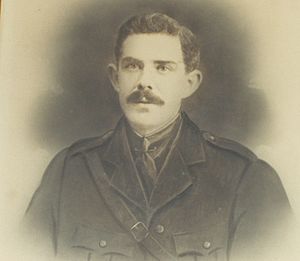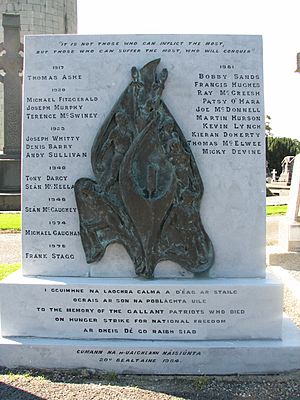Denny Barry facts for kids
Denis "Denny" Barry (born July 15, 1883 – died November 20, 1923) was an Irish Republican. He sadly passed away during a hunger strike soon after the Irish Civil War.
Contents
Early Life and Interests
Denis Barry was born in 1883 into a farming family. This was in Riverstick, a place in south County Cork, Ireland. From a young age, he learned to speak the Irish language.
In 1903, Denny moved to Cork City. There, he worked in a shop that sold fabrics and clothes, called a drapery. He became very active in groups that promoted Irish culture and history. These included the Gaelic League and the Ancient Order of Hibernians. Denny was also a talented athlete. He played hurling, a traditional Irish sport, for the Cork team.
Joining the Volunteers
In 1913, Denny joined the Irish Volunteers. This was a new group formed to protect Ireland's rights. In 1915, he moved to Kilkenny for work. He continued his work with the Volunteers there.
After the Easter Rising in 1916, the British Government arrested many Irish Volunteers. Denny was arrested in Kilkenny and sent to Frongoch internment camp in North Wales. This was a camp where people were held without being charged with a crime.
In 1919, Denny returned to Cork. During the Irish War of Independence, he became a leader in the Irish Republican Police in Cork. He helped prisoners escape and worked to return stolen goods after the terrible burning of Cork by the Black and Tans.
After the Anglo-Irish Treaty was signed, there was a big disagreement in Ireland. Denny chose to support the side that was against the Treaty. He was later captured by troops from the Irish Free State. On October 6, 1922, he was sent to Newbridge internment camp. He was held there without being charged or found guilty of any crime.
Hunger Strike and Passing
In 1923, many Irish Republican prisoners began a hunger strike. They were protesting against being held without charges or trials. They also protested the poor conditions in the prisons. The strike started in Mountjoy Prison and quickly spread.
Denny Barry joined the hunger strike on October 16. He continued his protest for 35 days. Sadly, he passed away on November 20, 1923, at a hospital in Curragh Camp.
Other Irish Republicans also died during this time. Joseph Whitty from Wexford died on September 2, 1923. Andy O'Sullivan (Irish Republican) died on November 22, 1923, in Mountjoy Prison. The hunger strike was called off the very next day, November 23. Denny Barry, Joseph Whitty, and Andy O'Sullivan were three of 22 Irish Republicans who died on hunger strike in the 20th century.
At first, the Free State army buried Denny in the Curragh. But three days later, a court order allowed his family to move his body. Denis Barry is now buried in the Republican plot at St. Finbarr's Cemetery in Cork.
Remembering Denis Barry
Before Denny's body arrived in County Cork, the Bishop of Cork, Daniel Cohalan (bishop of Cork), sent a letter to Catholic Churches. This letter told them not to open their doors for Barry's body. This was different from how the Bishop felt about the death of Terence MacSwiney, the Lord Mayor of Cork, who also died on hunger strike in 1920. For MacSwiney, the Bishop had said he was a "martyr" for Irish freedom.
In Denny Barry's hometown of Riverstick, there is a stone memorial. It was put up in 1966 to honor him. Every November, people gather there to remember him with a wreath-laying ceremony.
 | Jessica Watkins |
 | Robert Henry Lawrence Jr. |
 | Mae Jemison |
 | Sian Proctor |
 | Guion Bluford |



